Eugène Burnand, “Friar Bentivoglia tends a leper” (1919).
“There is simply no group as marginalized in the Catholic Church as LGBT people. Sometimes they’re treated like lepers.” – James Martin
In 1987, when I was eighteen years old, Pope John Paul II visited my hometown of San Francisco; as a teenager obsessed with Madonna, pornography, and acid-washed jeans, I was supremely disinterested. But I immediately took notice when I heard on several TV news reports that the Holy Father would meet with various AIDS victims; including some “gay” men. At the time, many in the LGBT community considered this small act of kindness as too-little-too-late, citing efforts by the Church to promote the message of abstinence instead of condoms with regards to HIV education targeting the young. But, by then, I had decided to follow my own inner voice. This decision was a sort of surrender to the ineffectual Christ that had been presented to me since childhood. I conversely liked the idea that a personal conscience was the supreme arbiter of morality, but I subconsciously hated the utter lack of absolute truth. I wanted Christ to be my Savior, but instead I transferred my boyish need for a strong Messianic figure to an obsession with supremely masculine and incredibly decisive superheroes from Buck Rogers to The Six-Million Dollar Man. In my attraction to these men, I somehow found truth in knowing: I was “gay,” I was born gay. Later, a sympathetic priest told me that God created me this way, that He understood, only I needed to practice safe-sex. According to him, that’s where the conscience played a part – in that I had to act responsibly. And he added, like my heterosexual counterparts, I should try to form a stable monogamous relationship.
The following year, for the first time, I would walk into the Castro District of San Francisco during the height of the AIDS crisis. I was somewhat naive and desperately in need of masculine affirmation and attention. I understood that there would be risks in this endeavor, but I knew that I would never end up like those thin, blotchy, diseased looking men who reached out towards Pope John Paul. Although I had no idea, also in 1988. Not far away, Mother Teresa’s Missionaries of Charity were foundering an AIDS hospice.
In the beginning, I had never experienced such joy. The once awkward sissy boy that no one wanted to sit next to at lunchtime suddenly realized that the bar stool beside him was never empty. I was simultaneously embarrassed and made drunk by all the recognition. But for awhile, I was like the famished Hansel and Gretel just come upon the witch’s house; but, as they found out, I too would pay a price for my gorging. The more I consumed, the emptier I felt.
Almost every day, on my way to school, the dance clubs, or the occasional lonely walk to the bathhouse, I would pass by the local Catholic parish. It was an odd forgettable building only a few blocks up from the Castro Street party scene. Once I reached the corner where the Church was, I could just began to hear the music emanating from the various bars and discos. I knew I was almost there. I never paid much attention to the place. Occasionally I would see a rainbow banner flapping in the breeze near the doorway. Over the next several years, I attended a few funerals at the Parish – all for men who died of AIDS. The priest was incredibly compassionate, touching those that many in society considered untouchable. The casket was almost always closed. He talked about how “gay” men and women often felt abandoned simply because they were born different. I thought he was right.
One day, I accompanied a friend on a visit to see his former lover – now a resident at Mother Teresa’s AIDS hospice. The place was incredibly clean, but the wafting smell of disinfectant couldn’t erase the stench of death. Somewhere, I walked by a crucifix on the wall. It was a momentary glimpse of an image I hadn’t seen in years. I was started by it. Here, death was certain – death on the cross or death in a bed. I was uneasy as long as I stayed there. I began to pester my friend into making his visit short. That night, I danced and forget about everything that passed during the day. Nothing like that would ever happen to me.
Nothing turned out the way I expected. Although I never became HIV-positive, I contracted a series of sexually transmitted infections including rectal gonorrhea, Chlamydia in the throat, and numerous yeast infections. I was anemic from near constant bleeding from the anus, I suffered a prolapse and a proctologist recommended immediate surgery. In this sorry state, I inexplicably stumbled back to the Catholic Church.
With a visible bloodstain on the seat of my pants, I went to talk with a nearby Catholic priest. I don’t know why I went, I think in a strange way I was reaching out towards something substantive – for the Cross I briefly sighted out of the corner of my eye at the AIDS hospice. My hope dissipated and my shoulders slumped almost to the floor when the priest said that because I was born gay, there it was again: I couldn’t escape it. He also claimed that since I was gay, there had been no conscious sin on my part – therefore there was nothing to forgive. His patronizing, which I am sure he measured as being pastoral, was like a condemnation when he advised me to yet again look for someone to settle down with. I walked away, the same seeping mess, just as that priest found me.
During those years I spent as a gay man, my father and mother always loved me – and I knew it. But they couldn’t stand what I had become – and I knew that as well. I kept my distance. When I finally crashed, I returned to my parent’s home. They never flew the rainbow flag. In fact, my father rather dispassionately once told me what he thought about my lifestyle. I took it as an attack on me. After, all I was gay; homosexuality comprised the central core of my being.
My father and mother opened their arms to me when they saw their wayward son rounding the corner. I had been lying with pigs. I was covered in dirt, filth, and blood, but to them I was beautiful. During the following several days, I kept to myself. I slept, I prayed though I didn’t know how, and I repeatedly soiled myself and my bed sheets. I was constantly in the shower trying wash away the decay of my past. It refused to go away. What I hoped would circle down the drain into nothingness, remained firmly adhered to my skin.
I remembered a priest from a previous loathsome visit home, sometime near a Christian holiday, when my parents badgered me about attending Mass with them. Although I detested the idea of going, for an unknown reason, I relented and went along. The priest I remembered had a forceful quality about his speech and knowledge that sounded expansive and sure. I overheard my parents say that this man was unpopular and noted for being too orthodox. I was impressed. But I never spoke with him. I had no need for new male role-models, back in the Castro I had men that I could instantly touch. Yet, after years of intense physical contact, I was lonelier than ever.
Almost right away, I went to talk with this priest. Immediately, I was bemused by his behavior. I told him a little about myself and he proceeded to treat me in a way I thought was odd. He didn’t act as if I were a special case. I thought I was unique, and my problems peculiar. I was creative and sensitive; I therefore imagined that my special attributes required special attention. Yet, he treated me like a man. I had never experienced interaction like that before. Because in the world of male homosexuality, everything was about posing and positions from a preoccupation with penis size to who was on top. Here, my healing began with the realization that God hadn’t made me gay – He had made me a man. Somewhere along the way, I lost sight of that, or, more precisely, it never even entered my field of vision. Because for young men with an uneasiness about themselves and how they perceive other men, there are few, if any, areas in which to explore this problem except in gay male pornography. Particularly over the last few years, gay porn is increasingly preoccupied with what was once a niche sub-genre: “daddy porn.”
Men who are generally introspective and often lacking the large network of sisters, cousins, and girlfriends that women frequently consult on issues ranging from dating to fashion, trend towards attempts at self-diagnosis and self-healing; for this reason, men are more likely than women to be alcoholics, to kills themselves, and to be gay. It’s also not coincidental that men are the majority of pornography consumers. In watching porn, in this case – a scenario depicting mock father/son relationships, men are haplessly trying to work through their so-called daddy issues. The result is further isolation and a multiplication of wounds. This failure to find relief should precipitate a reevaluation of previous tactics, instead it typically begins further explorations down the same road; and, like those men who delve deeper into increasingly sick forms of porn, or more deviant and violent types of sexual practices, almost no man lost on a roadway that he is sure will lead him home, is apt to turn around or ask for directions. For this particularly explains why mental health disorders remain proportionally higher among gay men and women as compared with their heterosexual counterparts; even in nations (Sweden and the Netherlands) with a long history of gay affirmation and civil rights. Living through the experience of accidentally losing control over your bowels in public is instantaneously humiliating. From that point onward, I had less of self-constructed core intact and I was willing to at least take a longer look at myself.
The late-Jesuit John J. McNeill persistently argued:
“…that God created us, God would be sadistic if he created you gay and said ‘you can’t act on it.’ Everyone has a right to – a sexual right. And they also have the duty to use their sex appropriately, you know. No dealing with minors or rape anything like that but I think if any human, gay or straight, has sex in a consenting relationship – especially a loving relationship – then I think God approves of it.”
Recently fellow Jesuit James Martin said in a video interview: “The idea that someone can come-out and be honest and transparent and open about the way that God created them, I think is terrific – it’s something the Catholic Church can support.” Because there are those like McNeill and Martin who believe erroneously that some people were “born this way,” or even that God created them gay, the Church therefore has to change its most basic teachings on the issue of homosexuality. Usually, they begin with demanding a revision of the Catechism, in particular the term “intrinsically disordered.” Calls for those words to be eliminated from the Catechism are a hallmark of all gay-affirmative Catholic ministries and outreaches. McNeill once claimed:
“Since most gay people experience their homosexual orientation as a part of creation, if they accept this Church teaching, they must see God as sadistically creating them with an intrinsic orientation to evil. Most gays would prefer to see the Church teaching as wrong, rather than believe God is sadistic.”
Martin concurred when he boldly wrote: “Saying that one of the deepest parts of a person—the part that gives and receives love—is “disordered” in itself is needlessly cruel.”
In my experience, actually the opposite is true. When priests confirmed my inborn homosexuality, they repeatedly sent me back to a life that clearly wasn’t working. In a sense, they refused to look further beyond what they simply saw as the “gay” man in front of them. Perhaps, they were trying to be proactive in that they wanted to steer me towards what some perceived as the better situation: a stable monogamous relationship as a bulwark against the onslaught of AIDS. Perhaps, they were taking a more gradualistic approach. I will never forget a dear friend who was never quite as self-assured concerning his identity as I was; he seemed to waiver and I thought it a hold-over from his religious upbringing. One day he was elated when a priest recommended McNeill’s “The Church and the Homosexual.” From then on, he knew that God created him this way – therefore he could no longer deny it. A few years later, he would be dead from AIDS.
In hindsight it’s also curious how these gay-affirmative priests often conformed to a certain homosexual stereotype of the slightly effeminate, overly accommodating, and highly affected man. But at their worst, they were deliberately cooperating in a form of identity politics: pitting the victimized gay man or women against the Church. They have created their own problem by assuring homosexuals who have access, at least in the United States, to a myriad of gay-affirmative Catholic ministries, that they are actually the innocent scapegoats of a homophobic patriarchal system. But that alleged victimization does not emerge from any deliberate hatred or ill-treatment of homosexuals by the priesthood or the laity, but by the simple recitation of official Church teaching.
The priest who eventually helped me out of the homosexual mess was very much like those men who told me that God made me gay, and then he was nothing like them. He was caring and compassionate, in that he thought I deserved to hear the truth; not just what I wanted to hear. Some of what I heard and read, I took very well. Other things, I had a difficult time with. As evidenced in my damaged body, I became an unwitting albeit strident proponent of natural law, but in terms of homosexuality, I still steadfastly believed God made me gay. And, although chastity in the beginning was rather easy, I was like a queasy kid a few days after Halloween who never wants to see candy-corn again. But as summer turned into fall, I became homesick for the quick pickings of treat or treat. In my absence from the gay scene, I inadvertently learned that the internet now facilitated a wide range of hook-ups between men; often categorizing and thus matching users with those who are interested in reenacting similar shared fantasies – for example, intergenerational sex. As a result, I felt partially cheated. God was demanding something from me, but He had essentially left my desires wholly intact with no way to express them. My priest friend then recommended a support group he heard of – Courage.
I was incredibly nervous when I finally decided to attend my first Courage meeting, but the priests who assisted the group discussions and heard Confessions reminded me much of my stalwart and truthful priest friend who recommend them in the first place. These men were not remarkable for their physical statute or those masculine attributes which are so highly prized in the gay male community, but a distinguishing feature of their overall character was this conspicuous quality of confidence and peaceful reliance on the truth. This was masculinity, at first I was bewildered by this combination of concentration and caring; these same ingredients in a married man is what makes an effective father. I imagine the still calmness in the quiet scene between the public sinner and Christ, immediately following the violent incident of a near-stoning punctuated by the gentle, compassionate, but forceful directive: “Go, and now sin no more.” The priests in Courage were giving the same advice, in the same Christ-like manner. Like the Apostles, they were given the power to forgive sins through the Sacrament of Confession; and then to both repudiate the sin while embracing the sinner. Some see this as a contradiction in terms, but that only applies to those who see the individual and the gay identity as one in the same.
Then the holy lover of complete humility went to the lepers and lived with them, serving them most diligently for God’s sake; and washing all foulness from them, he wiped away also the corruption of the ulcers, just as he said in his Testament: “When I was in sins, it seemed extremely bitter to me to look at lepers, and the Lord himself led me among them and I practiced mercy with them.” – The Life of St. Francis of Assisi by Thomas of Celano
The problem with the approaches advocated by the likes of McNeill and Martin, is that the leper is simply left as they found him. Men such as St. Francis, and the Missionaries of Charity at their AIDS hospice, do the dirty work of healing bodies, minds, and souls. The priests of Courage, and all good and faithful priests, participate in the same often ugly labors: changing adult diapers and bedpans, listening to traumatized men speak of past abuse and negligent, warning the sinner to change what has become comfortable and complacent. To clean up these messes is often painful and words can sting, but that doesn’t mean you should not make the attempt. If these devoted men and women of the Catholic Church treated homosexuals like lepers, they did so in the same manner ad St. Francis – with gentleness and fortitude. St. Josemaria Escriva said:
“To heal a wound, the first thing to do is to clean it well, including a wide area around it. The surgeon knows that the cleaning hurts, but he also knows that there will be worse pain later if it is not done.”
A phrase often attributed to St. Francis goes something like this: “Preach the gospel, and if necessary, use words.” Conversely, Martin, and McNeill before him, spoke and wrote a lot. This is peculiar since Martin claims that: “the Church has been really good at writing documents about them [homosexuals], preaching to them, fulminating about them, tweeting about them, condemning them, but they don’t listen to them very much.” But who is Martin listening to? Because, historically, unlike the Franciscans, the Jesuits have a documented penchant for aligning themselves with the powerful and the wealthy. From this small sub-sect of the gay a community, during a cocktail party at Fordham or Boston College, I’m sure Martin heard from a few homosexuals that not every priest they encountered was fully onboard with their same-sex partnerships or marriages. The various men I knew at Courage, never spoke of a sharp-tongued priest who told them to get out of his church; on the contrary most told parallel stories to mine concerning gay-affirmative priests that encouraged the born gay theory and the apparent happiness to be found in same-sex monogamy. Courage had become a refuge where at least a sincere Confession could receive absolution. This is also why Martin is repeatedly short on specifics with regards to his claim of “priests saying terrible things to LGBT people.” For instance, in New York City, which has the largest LGBT population in the United States there are at least five Catholic parishes (St. Paul the Apostle, St. Francis de Sales, St. Francis Xavier, St. Francis of Assisi, and the Church of the Blessed Sacrament) with highly gay-affirmative ministries that are either headed by gay advocates or coupled/married homosexuals; his personal favorite being Out At St. Paul located at St. Paul the Apostle Church, which funded and produced a video series detailing the open disagreement many of its members have with basic Church teaching.
Christ Himself pitied the lepers. One stricken man in particular, who humbly knelt before Jesus and begged to be healed, was instantly cured with a single touch from Our Lord. Another incident occurred when Jesus entered a town:
And it came to pass, as he was going to Jerusalem, he passed through the midst of Samaria and Galilee. And as he entered into a certain town, there met him ten men that were lepers, who stood afar off; And lifted up their voice, saying: Jesus, master, have mercy on us. (Luke 17: 11-13)
Neither Jesus Christ, the Church, nor Her faithful priests ever turned away the true penitent. As Jesus revealed to St. Faustina: “I cannot punish even the greatest sinner if he makes an appeal to My compassion…” Yet, those who follow the words of James Martin, and John McNeill before him, believe erroneously – “that’s the way God created you.” Therefore, to express that “deepest” part of yourself, “the part that gives and receives love,” which was given to you by God, is not sinful. Consequently, it is the laws of God which need to be “updated.” In this world, there are no penitents before the Lord, no one wants to be healed, because there is nothing to confess and no wounds to be made clean.
For what seemed a lifetime, I somewhat aimlessly drifted around the country and the globe. I was looking for salvation, trying to escape my past, and hoping to find a hiding place from a world that wanted to suck me back into hell. For the most part, I sought out the steadiness of Tradition and an abhorrence of experimentation in the Tridentine Liturgy. The priests who staunchly followed the rubrics of the Latin Mass were correspondingly unwavering in their allegiance to Catholic teaching. This was a welcome respite from the pastoral inconsistency that I found in my local parishes. On my travels, I stopped by such ultra-conservative groups as the Society of St. Pius X and the Benedictine Monks at Fontgomabult. Not one of them ever turned me away. I think it was because I arrived on their doorsteps with my head down. They recognized a shattered man and took pity on him.
Just a little over a year after being saved from the clutches of homosexuality, I visited a shelter for men in the Bronx run by the Franciscan Friars of the Renewal. I was drawn to the place because there was something authentic and true about how the Friars of the Renewal were living in accordance with the original intent of St. Francis. It was like an oasis of sanity in a sea of hopelessness and sorrow. But what impressed me the most were the Friars; they were strong men: shaved heads, rough bare feet, with powerful looking hands. They seemed to create order by the power of their presence. The sight of them was shocking; it was a similar revelation as to the one I experienced in the AIDS hospice so many years before when I passed a crucifix. They had a magnificent stability and poise of inner-strength that was never proud or haughty but completely selfless. Their demeanor seemed incredibly suited to helping the often disturbed men under their care. The work of the Friars draws less attention than the voluminous utterances of James Martin, but in their humility and silence they heal wounds and convert souls through example by living in a way that is right and faithful to the Gospels. Not surprising, one of the founders of the Friars, Benedict Groeschel, often spoke and wrote about homosexuality. On the very topic of gay affirmative ministries and facilitating priests, Groeschel wrote:
There are many serious objections to this kind of compassion based on pragmatism and relativism…The most obvious…objection is that such thinking precludes the possibility of moral conversion and true Christian discipleship. Apart from the radical denial of truth, such thinking leaves the person lost in a swamp without a map. It is a most dangerous compassion.
He continued:
Once, a young man who had given up the fight to live chastely and had decided to have a live-in homosexual relationship made two requests of me. He said, “Don’t reject me, and don’t agree with me. If you agree with me I will never get out of this.”
The major difference between the priests involved with Courage, as well as Fr. Groeschel and other faithful priests, and John McNeill and James Martin is that Courage begins with approaching (or accompanying) the individual, not the “gay” man or woman. Courage takes seriously this pronouncement from the Catholic Church:
Today, the Church provides a badly needed context for the care of the human person when she refuses to consider the person as a “heterosexual” or a “homosexual” and insists that every person has a fundamental Identity: the creature of God…
A leper, even in his deeply wounded state is not simply a diseased individual, but a man or a woman loved by God. And by Grace alone, I was blessed to know priests who saw beyond my ugly deformed facade; to their eternal credit, my parents never gave up that their son was still somewhere hidden inside the gay man. And as St. Francis and his Brothers had done so many years before, these kind and humble priests anointed and bandaged my wounds – not with the dripping honey of their melodious words of agreement, but with the righteousness of Truth. Like the full-throated male voices of Gregorian chant, what I heard was strong and sure. Those who repeatedly said I was gay – now sounding like a song from Lady Gaga that played every time I turned the radio on, their tinkling sounds were disappearing into the distant and darkening horizon; hopefully, never to be heard from again.
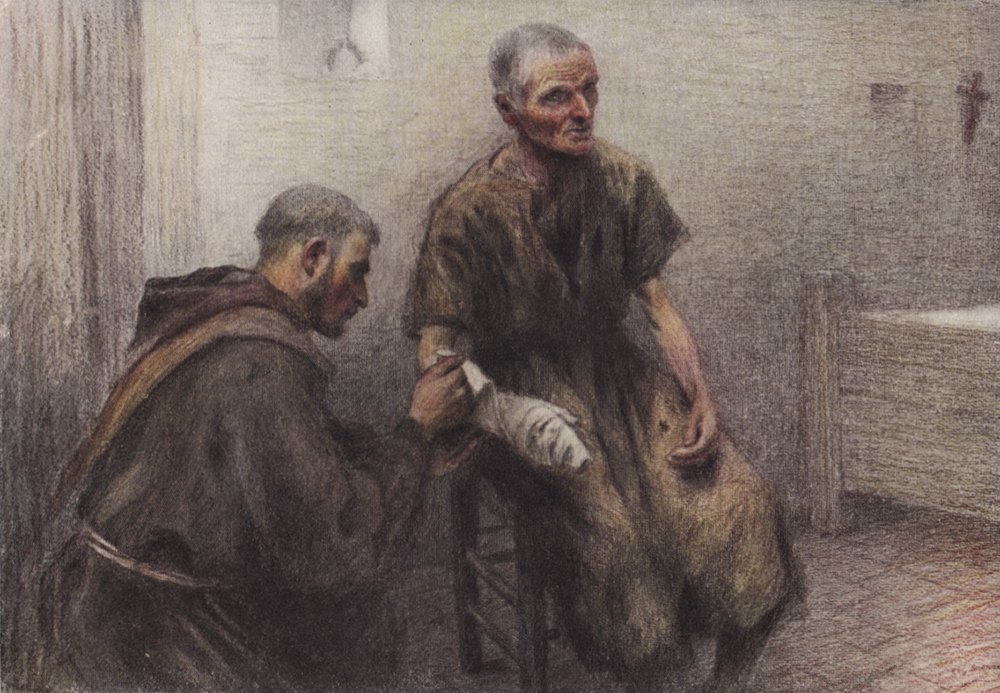
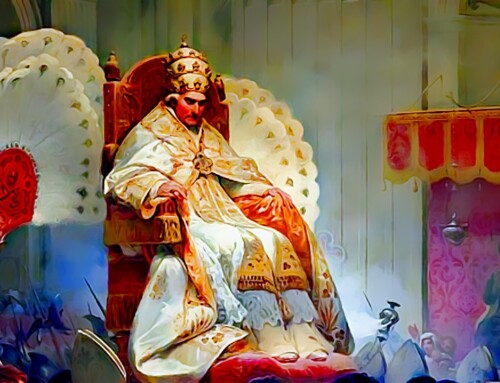
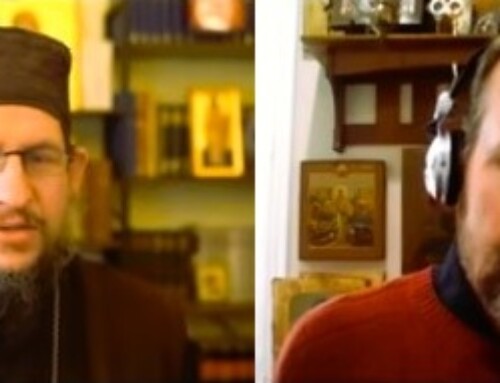
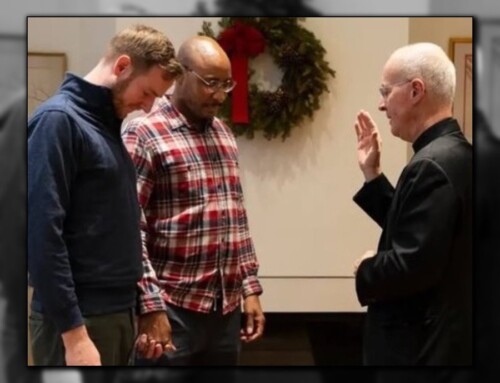
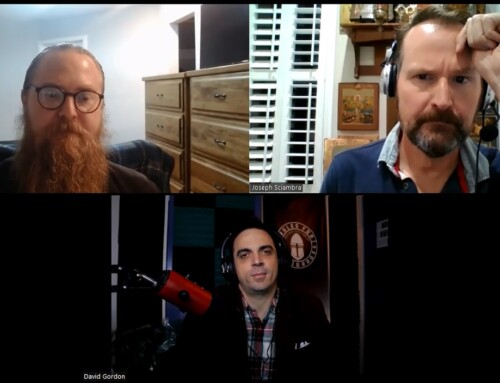
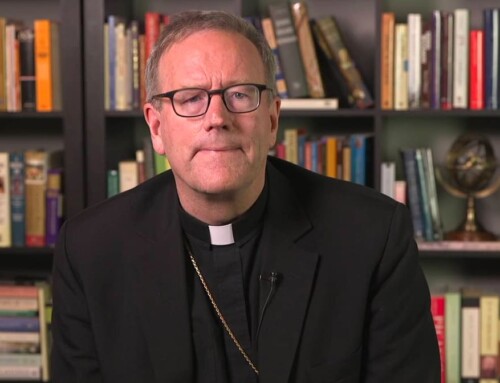
This is just a splendid testimony, thank you.
God bless you.
+
Deeply moving story. My petitions for your ongoing healing.
Great article! Thank you for sharing this. It is so critically important to get this message out. Thank you.
Praise God for his mercy to you and to me. May your healing and your writing continue.
“But he (the healed leper) went out and began to talk freely about it, and to spread the news,…” Thanks for spreading the good news that there is hope.”
This story demonstrates the elaborate and complicated extent to which Satan will go to enslave and kill a soul. Thank you for the distinctions, definitions, and the Truth. What could be worse than being sent back into hell? God bless you. May this lead to recovery for many suffering souls. Thank you.